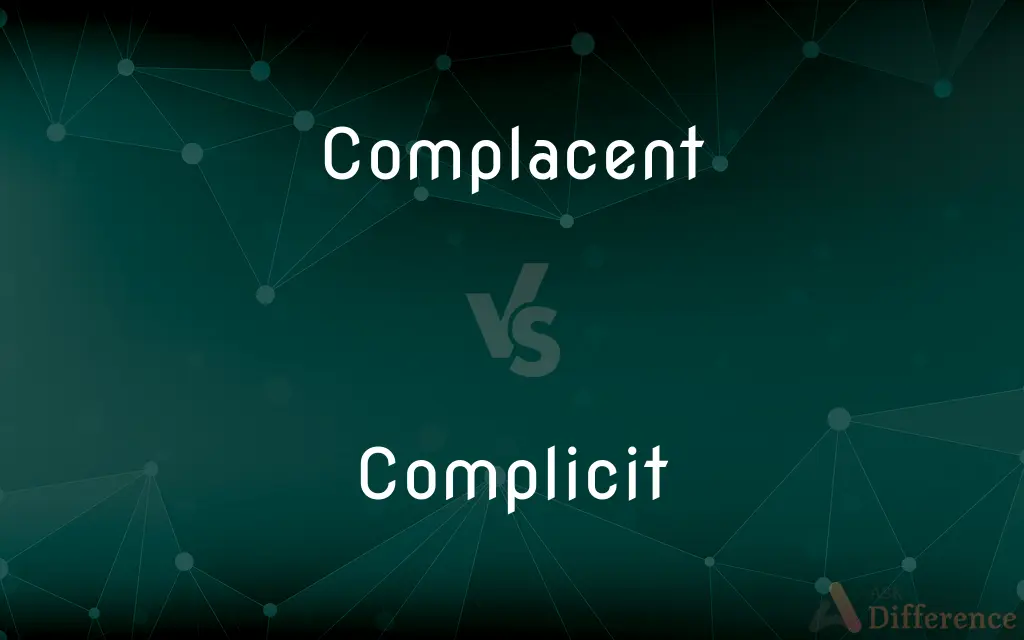Complacent vs. Complicit — What's the Difference?
By Maham Liaqat & Fiza Rafique — Updated on April 3, 2024
Complacent describes a self-satisfied attitude with no desire for change, while complicit means being involved with others in wrongful acts.

Difference Between Complacent and Complicit
Table of Contents
ADVERTISEMENT
Key Differences
Complacency is a state of being self-satisfied and unbothered about changing one's situation or addressing potential problems. This attitude often stems from a sense of contentment with the status quo, leading to a lack of motivation to improve or react to new challenges. Conversely, being complicit involves participation or implied involvement in an act that is typically considered wrong or unethical. It suggests a degree of responsibility for negative actions or outcomes, even if one is not the direct perpetrator.
While complacency denotes a passive state of contentment, complicity implies active or passive participation in wrongdoing. A complacent individual may be unaware or indifferent to issues around them, lacking the drive to engage or make changes. On the other hand, someone complicit is aware of their contribution, whether through action or inaction, to a situation's negative aspects.
Complacency can be seen as a personal mindset that affects one’s own life and immediate surroundings, characterized by self-satisfaction and an absence of desire for change. Complicity, however, has broader implications, often involving ethical or legal dimensions, where one's actions or failure to act contribute to the harm or wrongdoing committed by others.
The consequences of complacency are generally internal or affect personal and professional growth, leading to missed opportunities or inability to adapt to change. In contrast, the ramifications of complicity can extend beyond the individual to impact others, resulting in legal, social, or professional consequences depending on the nature of the involvement in wrongful acts.
Both terms highlight different aspects of human behavior and ethical considerations. Complacency reflects an internal attitude that may hinder personal progress, while complicity points to the moral implications of one's actions in relation to the actions of others.
ADVERTISEMENT
Comparison Chart
Definition
Self-satisfied with no desire for change.
Involved with others in wrongful acts.
Nature
Passive attitude towards self-improvement.
Active or passive involvement in unethical acts.
Implications
Personal growth and adaptability are affected.
Ethical, legal, and social ramifications.
Consequences
Missed opportunities, inability to adapt.
Potential legal or social accountability.
Focus
Internal mindset and attitude.
Involvement in or responsibility for actions of others.
Compare with Definitions
Complacent
Feeling of uncritical satisfaction with oneself.
The team became complacent after a series of easy wins.
Complicit
Implied participation in unethical behavior.
By staying silent, she was complicit in the wrongdoing.
Complacent
Lack of desire to improve or change.
His complacent attitude towards work led to missed promotions.
Complicit
Involved in or knowledgeable about wrongful acts.
He was complicit in the scheme, despite claiming ignorance.
Complacent
Indifference to potential problems.
Complacent about security, they didn't install an alarm system.
Complicit
Aiding in acts considered morally wrong.
Being complicit in fraud can lead to severe legal consequences.
Complacent
Self-satisfaction leading to inactivity.
Their complacent nature made them overlook competitive threats.
Complicit
Involvement through action or inaction.
Their inaction made them complicit in perpetuating the problem.
Complacent
Content with current achievements.
She remained complacent about her technological skills, ignoring new trends.
Complicit
Sharing responsibility for negative actions.
Employees felt complicit for not reporting the safety violations.
Complacent
Apathetic with regard to an apparent need or problem.
Complicit
Involved with others in an activity that is unlawful or morally wrong
The careers of those complicit in the cover-up were blighted
Complacent
Showing smug or uncritical satisfaction with oneself or one's achievements
You can't afford to be complacent about security
Complicit
Associated with or participating in a questionable act or a crime; having complicity
"Presidential handlers and a complicit press corps managed to suppress public awareness" (Andrew P.N. Erdmann).
Complacent
Satisfied with the current situation and unconcerned with changing it, often to the point of smugness
"a geologic cautionary tale for a complacent world accustomed to reliable infusions of cheap energy" (Paul Roberts).
Complicit
Associated with or participating in an activity, especially one of a questionable nature.
Complacent
Eager to please; complaisant.
Complacent
Uncritically satisfied with oneself or one's achievements; smug.
Complacent
Self-satisfied; contented; kindly; as, a complacent temper; a complacent smile.
They look up with a sort of complacent awe . . . to kings.
Complacent
Contented to a fault;
He had become complacent after years of success
His self-satisfied dignity
Common Curiosities
What is the definition of complicit?
Complicit refers to being involved with others in an act considered wrongful or unethical.
What are the consequences of being complicit?
Being complicit can result in ethical, legal, or social consequences, depending on the nature of the involvement in wrongful acts.
Can complacency lead to complicity?
Yes, complacency can lead to complicity if one’s indifference or lack of desire to change contributes to the continuation of wrongful acts.
What does it mean to be complacent?
Being complacent means being self-satisfied and having no desire to change or improve one's situation.
Can someone be unwittingly complicit?
Yes, one can be unwittingly complicit through inaction or ignorance that indirectly supports or enables wrongful acts.
What role does intention play in complicity?
Intention can determine the degree of moral or legal culpability in complicity, though legal systems may vary in how they assess it.
How can one avoid becoming complacent?
Avoiding complacency involves seeking new challenges, remaining open to learning, and being proactive in personal and professional development.
How does complacency affect personal growth?
Complacency hinders personal growth by creating a barrier to learning, adapting, and taking on new challenges.
Is complacency always negative?
While complacency can lead to missed opportunities, in some contexts, it may reflect contentment; however, it is generally seen as negative in dynamic or competitive environments.
Can organizations be complicit in unethical activities?
Yes, organizations can be complicit through policies, practices, or cultures that enable or overlook unethical activities.
What can be done to address complicity in social or professional circles?
Addressing complicity involves fostering a culture of accountability, encouraging ethical behavior, and providing channels for reporting wrongdoing.
What is the impact of complacency in the workplace?
Complacency in the workplace can lead to decreased innovation, productivity, and adaptability to change.
How does societal perception affect those deemed complicit?
Societal perception can lead to stigma, ostracization, or damage to one’s reputation and professional relationships.
How do complacency and complicity differ in terms of action?
Complacency is characterized by inaction and satisfaction with the status quo, while complicity involves actions or inactions that contribute to wrongdoing.
Are there positive aspects to being complacent?
While generally viewed negatively in terms of progress and growth, some may interpret complacency as a form of contentment in personal life, not necessarily requiring change.
Share Your Discovery

Previous Comparison
Secretariate vs. Secretariat
Next Comparison
Telecom vs. TeleconAuthor Spotlight
Written by
Maham LiaqatCo-written by
Fiza RafiqueFiza Rafique is a skilled content writer at AskDifference.com, where she meticulously refines and enhances written pieces. Drawing from her vast editorial expertise, Fiza ensures clarity, accuracy, and precision in every article. Passionate about language, she continually seeks to elevate the quality of content for readers worldwide.















































